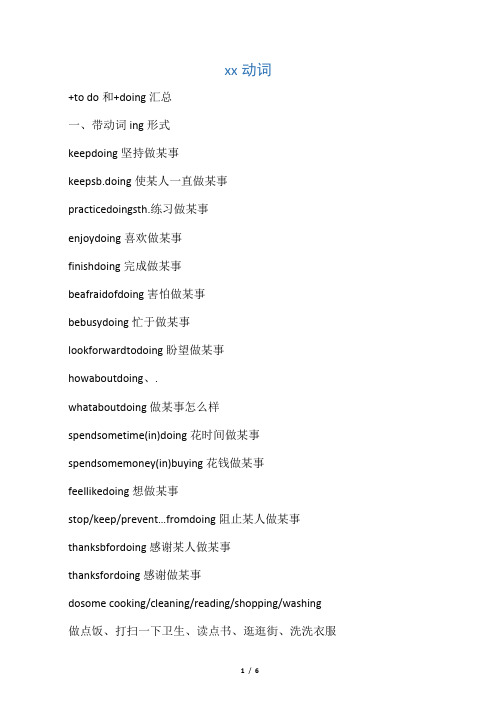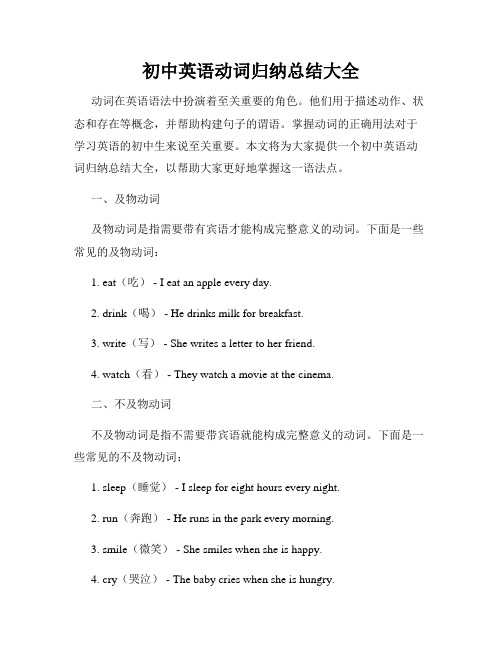初中英语知识点总结:动词
初中英语动词to do和doing总结

xx动词+to do和+doing汇总一、带动词ing形式keepdoing坚持做某事keepsb.doing使某人一直做某事practicedoingsth.练习做某事enjoydoing喜欢做某事finishdoing完成做某事beafraidofdoing害怕做某事bebusydoing忙于做某事lookforwardtodoing盼望做某事howaboutdoing、.whataboutdoing做某事怎么样spendsometime(in)doing花时间做某事spendsomemoney(in)buying花钱做某事feellikedoing想做某事stop/keep/prevent…fromdoing阻止某人做某事thanksbfordoing感谢某人做某事thanksfordoing感谢做某事dosome cooking/cleaning/reading/shopping/washing 做点饭、打扫一下卫生、读点书、逛逛街、洗洗衣服goswimming/fishing/shopping/skating/boating 去游泳、钓鱼、逛街、xx、划船minddoing介意做某事can’thelpdoing情不自禁做某事considerdoing考虑做某事havefundoingsth..做某事有趣havedifficultydoingsth做某事有困难havetroubledoingsth做某事有困难haveproblemdoingsth做某事有困难wastetime/moneydoing浪费时间或金钱做某事insteadofdoing代替做某事missdoing错过做某事holdontodoing坚持做某事payattentiontodoing集中精力做某事suggestdoing建议做某事It’stimefordoing到该做某事的时间了Thereissbdoingsth有人正在做某事beusedtodoingsth习惯做某事beusedfordoingsth被用来做某事havealotofexperience具有做某事的丰富经验sballowdoingsth允许做某事putoffdoingsth推迟做某事succeedindoingsth成功做某事endupdoing以做某事结束giveupdoing放弃做某事二.含有不带to的动词不定式句型(动词原形)1.hadbetter(not)dosth.最好(不)做某事2.wouldyouplease(not)dosth你可以做某事吗?3.whynotdosth.为什么不做某事?whydon’tyoudosth.为什么你不做某事?4.Shallwedosth.?我们要做某事吗?5.letsbdosth.让某人做某事6.makesb.dosth.havesbdosth使某人做某事7.feelsbdosth感觉某人做某事三、含有带to的动词不定式句型1.It’stimetodosth.该是做某事的时候了2.Ittakessb.sometimetodosth做某事花了某人时间3.tell/ask/want/encourage/invite/sb.todosth.告诉、叫、想、鼓励、邀请某人做某事4.Wouldyouliketodosth.?你想做某事吗?5.It’s good/badtodosth做某事好/不好6.It’sgood/badforsb.todosth.对某人来说,做某事好/不好7.be+adj.+enoughtodosth.足够+形容词做某事8.sb.isreadytodosth.某人准备好做某事9.It’s+adj.+forsb.todosth.做某事对某人+形容词(做这件事对你好)10.It’s+adj.+ofsb.todosth某人做某事+形容词(你做这事真好)11.wouldlike/love/decide/want/wish/todosth. 想、喜欢、决定、想、希望做某事12.wouldlike/lovesb.todosth.想让某人做某事13.prefertodoratherthandosth.宁愿做某事而不愿做某事四、两个动作连用,表目的:edtodosth过去常常做某事41.beusedtodosth被用来做某事42.besupposedtodosth理应做某事,应该做某事43.allowsbtodosth允许某人做某事44.sbbeallowedtodosth某人被允许做某事45.thebestwayistodosth最好的方法是做某事46.thenextstepistodosth下一步是做某事47.havenothingtodowith与某事无关48.thefirstthingistodosth第一件事是做某事49.it’sbesttodosth最好做某事50.it’sagoodtimetodosth这是做某事的最好时间itisagoodwaytodosth做某事是个好的办法51.addtodo补充做某事52.urgesbtodo催促某人做某事catesbtodo教育某人做某事54.waitforsbtodo等待某人做某事55. ordersbtodo命令某人做某事56.happentodosth碰巧做某事57.leadsbtodosth领导某人做某事58.it's agoodplacetodosth这是做某事的好地方59.invitesbtodo邀请某人做某事60.gettodosth设计做某事61.expecttodo期望做某事62.volunteertodosth志愿做某事63.offertodosth主动提供做某事64.haveanopportunitytodo有机会做某事65.getsbtodosth使某人做某事66.it’sone’sdutytodosth做某事是某人的责任esthtodosth用某物做某事68.besuretodosth一定会做某事69.havetodosth不得六、既用不带to的动词不定式又用现在分词的句型:用不带to的动词不定式(原形)强调动作的完成过程;用现在分词强调动作的进行状态。
初中英语知识点归纳动词的现在分词形式

初中英语知识点归纳动词的现在分词形式动词的现在分词形式是英语学习中的一个重要知识点。
现在分词是动词的一种非谓语形式,在句子中可以充当主语、宾语、定语、状语等多种语法成分。
本文将对初中英语中常用的动词的现在分词形式进行归纳总结,以帮助读者更好地掌握这一知识点。
一、现在分词的构成形式现在分词的构成形式为:动词原形 + -ing,例如:play - playing; read - reading。
二、表示主动意义的动词的现在分词形式1. 一般情况下,表示主动意义的动词的现在分词形式就是动词的原形加上-ing:play - playing;sing - singing;dance - dancing;swim - swimming;run - running;eat - eating;write - writing;study - studying;etc.2. 以不发音的字母e结尾的动词,去掉e后再加-ing:make - making;take - taking;come - coming;give - giving;live - living;etc.3. 以重读闭音节结尾,并且末尾只有一个辅音字母的动词,双写末尾的辅音字母,再加-ing:sit - sitting;put - putting;run - running;etc.4. 以辅音字母+y结尾的动词,将y变为i,再加-ing:study - studying;try - trying;fly - flying;etc.5. 以-ie结尾的动词,改-ie为-y,再加-ing:die - dying;lie - lying;tie - tying;etc.三、表示被动意义的动词的现在分词形式表示被动意义的动词的现在分词形式由"be"(am, is, are, was, were)+ 动词的过去分词构成:1. play - being played;2. sing - being sung;3. dance - being danced;4. swim - being swum;5. run - being run;6. eat - being eaten;7. write - being written;8. study - being studied;9. etc.四、表示完成意义的动词的现在分词形式表示完成意义的动词的现在分词形式由"have/has/had" + 动词的过去分词构成:1. play - having played;2. sing - having sung;3. dance - having danced;4. swim - having swum;5. run - having run;6. eat - having eaten;7. write - having written;8. study - having studied;9. etc.五、常见动词的现在分词形式总结以下是一些常见动词的现在分词形式的归纳总结:1. doing(do的现在分词)2. going(go的现在分词)3. saying(say的现在分词)4. getting(get的现在分词)5. making(make的现在分词)6. taking(take的现在分词)7. sleeping(sleep的现在分词)8. reading(read的现在分词)9. watching(watch的现在分词)10. writing(write的现在分词)11. running(run的现在分词)12. swimming(swim的现在分词)13. eating(eat的现在分词)14. studying(study的现在分词)15. etc.通过对常见动词的现在分词形式的归纳总结,我们可以更好地掌握动词的现在分词形式的构成规则,提升我们在英语学习中的应用能力和写作能力。
初中英语动词知识点总结、例句及练习题

初中英语动词知识点总结、例句及练习题动词类型动词是英语中最基本的词类之一,表示动作、状态、行为等。
根据动词的不同特点,可以将其分为以下几种类型:1. 及物动词:需要接宾语来完成意义的动词。
例:throw (扔),“He throws a ball.” (他扔一个球。
)throw (扔),“He throws a ball.” (他扔一个球。
)2. 不及物动词:不需要接宾语的动词。
例:run (跑),“The dog is running.” (那只狗在跑。
)run (跑),“The dog is running.” (那只狗在跑。
)3. 连系动词:用来表示主语的状态、特征或性质的动词。
例:be (是),“She is smart.” (她很聪明。
)be (是),“She is smart.” (她很聪明。
)动词时态动词的时态表示动作或状态发生的时间。
以下是常见的动词时态:1. 一般现在时:表示经常性的动作或现实存在的状态。
例:play (玩),“I play soccer every Sunday.” (我每个星期天踢足球。
)play (玩),“I play soccer every Sunday.” (我每个星期天踢足球。
)2. 一般过去时:表示过去某个时间发生的动作或状态。
例:watch (看),“She watched a movie last night.” (她昨晚看了一场电影。
)watch (看),“She watched a movie last night.” (她昨晚看了一场电影。
)3. 现在进行时:表示正在进行的动作。
例:study (研究),“They are studying for exams.” (他们正在为考试复。
)study (学习),“They are studying for exams.” (他们正在为考试复习。
)动词的形式动词可以根据不同的时态和语态变化形式。
初中英语动词to do和doing总结

xx动词+to do和+doing汇总一、带动词ing形式keepdoing坚持做某事keepsb.doing使某人一直做某事practicedoingsth.练习做某事enjoydoing喜欢做某事finishdoing完成做某事beafraidofdoing害怕做某事bebusydoing忙于做某事lookforwardtodoing盼望做某事howaboutdoing、.whataboutdoing做某事怎么样spendsometime(in)doing花时间做某事spendsomemoney(in)buying花钱做某事feellikedoing想做某事stop/keep/prevent…fromdoing阻止某人做某事thanksbfordoing感谢某人做某事thanksfordoing感谢做某事dosome cooking/cleaning/reading/shopping/washing 做点饭、打扫一下卫生、读点书、逛逛街、洗洗衣服goswimming/fishing/shopping/skating/boating 去游泳、钓鱼、逛街、xx、划船minddoing介意做某事can’thelpdoing情不自禁做某事considerdoing考虑做某事havefundoingsth..做某事有趣havedifficultydoingsth做某事有困难havetroubledoingsth做某事有困难haveproblemdoingsth做某事有困难wastetime/moneydoing浪费时间或金钱做某事insteadofdoing代替做某事missdoing错过做某事holdontodoing坚持做某事payattentiontodoing集中精力做某事suggestdoing建议做某事It’stimefordoing到该做某事的时间了Thereissbdoingsth有人正在做某事beusedtodoingsth习惯做某事beusedfordoingsth被用来做某事havealotofexperience具有做某事的丰富经验sballowdoingsth允许做某事putoffdoingsth推迟做某事succeedindoingsth成功做某事endupdoing以做某事结束giveupdoing放弃做某事二.含有不带to的动词不定式句型(动词原形)1.hadbetter(not)dosth.最好(不)做某事2.wouldyouplease(not)dosth你可以做某事吗?3.whynotdosth.为什么不做某事?whydon’tyoudosth.为什么你不做某事?4.Shallwedosth.?我们要做某事吗?5.letsbdosth.让某人做某事6.makesb.dosth.havesbdosth使某人做某事7.feelsbdosth感觉某人做某事三、含有带to的动词不定式句型1.It’stimetodosth.该是做某事的时候了2.Ittakessb.sometimetodosth做某事花了某人时间3.tell/ask/want/encourage/invite/sb.todosth.告诉、叫、想、鼓励、邀请某人做某事4.Wouldyouliketodosth.?你想做某事吗?5.It’s good/badtodosth做某事好/不好6.It’sgood/badforsb.todosth.对某人来说,做某事好/不好7.be+adj.+enoughtodosth.足够+形容词做某事8.sb.isreadytodosth.某人准备好做某事9.It’s+adj.+forsb.todosth.做某事对某人+形容词(做这件事对你好)10.It’s+adj.+ofsb.todosth某人做某事+形容词(你做这事真好)11.wouldlike/love/decide/want/wish/todosth. 想、喜欢、决定、想、希望做某事12.wouldlike/lovesb.todosth.想让某人做某事13.prefertodoratherthandosth.宁愿做某事而不愿做某事四、两个动作连用,表目的:edtodosth过去常常做某事41.beusedtodosth被用来做某事42.besupposedtodosth理应做某事,应该做某事43.allowsbtodosth允许某人做某事44.sbbeallowedtodosth某人被允许做某事45.thebestwayistodosth最好的方法是做某事46.thenextstepistodosth下一步是做某事47.havenothingtodowith与某事无关48.thefirstthingistodosth第一件事是做某事49.it’sbesttodosth最好做某事50.it’sagoodtimetodosth这是做某事的最好时间itisagoodwaytodosth做某事是个好的办法51.addtodo补充做某事52.urgesbtodo催促某人做某事catesbtodo教育某人做某事54.waitforsbtodo等待某人做某事55. ordersbtodo命令某人做某事56.happentodosth碰巧做某事57.leadsbtodosth领导某人做某事58.it's agoodplacetodosth这是做某事的好地方59.invitesbtodo邀请某人做某事60.gettodosth设计做某事61.expecttodo期望做某事62.volunteertodosth志愿做某事63.offertodosth主动提供做某事64.haveanopportunitytodo有机会做某事65.getsbtodosth使某人做某事66.it’sone’sdutytodosth做某事是某人的责任esthtodosth用某物做某事68.besuretodosth一定会做某事69.havetodosth不得六、既用不带to的动词不定式又用现在分词的句型:用不带to的动词不定式(原形)强调动作的完成过程;用现在分词强调动作的进行状态。
初中英语动词变形易考点总结

初中英语动词变形易考点总结一、加to do(不定式)1. want/would like (sb)to do sth想要(某人)做什么2. it is time to do sth该去做什么3.have time to do sth有时间做什么have no time to do sth=don’t have time to do sth没时间做什么4. learn to do sth学做什么5.get/be ready to do sth准备好做什么6. this/it is the first/second ...time to do sth 第一次/第二次......去做什么7. ask /tell sb (not)to do sth叫/告诉某人(别)去做什么8. start/begin to do sth开始做什么9. wish (sb)to do sth希望(某人)做什么hope(X)to do sth希望做什么10.it takes sb+时间/金钱+to do sth11.特殊疑问词+to doeg:what to do做什么how to do sth如何去做什么where to go去哪12.need(sb)/(sth) to do sth 需要(某人)/(某物)做什么13.plan to do sth 计划去做什么14.order sb to do sth 命令某人做什么15.seem to do sth 似乎要去做什么16....is a good place to do sth ......是一个好地方去做什么17.It is +adj to do sth 做什么怎么样eg:It is very important to wash our teeth every day. 每天刷牙很重要。
18.welcome to do sth 欢迎做什么eg: Welcome to visit my school.19.wait for sb to do sth 等待某人做什么二、加V-ing(动名词)(画“——”的都是介词)1.like/love/enjoy doing sth 喜欢做什么2.practise doing sth3.be good at/do well in doing sth4.how /what about doing sth5.get/be ready for doing sth6.have fun/have a good time doing sth7. thanks for doing sth=thank you for doing sth谢谢你做了什么thank sb for doing sth谢谢某人做了什么8.sb spend+ 时间/金钱+doing sth9.it’s time for(介词) doing sth是时间做什么10.be interested in doing sth 对做兴趣什么三、加do(原形)1.情态动词+do(can/could; shall/should; will/would; may/might; have to)2.使役动词+do(let/make/help)3.有助动词或者助动词否定形式时动词回归原形eg:Does he have any presents?(问句)He doesn’t have any presents.(否定句)4.why not do sth为什么不做什么5.祈使句Do sth eg: Open the door,please.Don’t do sth eg: Don’t close the door. It’s hot in the room.。
初中英语知识归纳总结——动词的时态

初中英语知识归纳总结——动词的时态动词的时态(一)教学重点一般现在时在英语中,不同时间里以不同方式发生的动作或存在的状态,要用不同的动词形式来表示,动词的这种不同形式称为动词的时态。
时态从时间上划分,可分为四大类:现在时;过去时;将来时;过去将来时。
从行为上,每一类可以分为四种形式:一般式;进行式;完成式;完成进行式。
这样英语的动词合起来,总共有十六种时态,初中只需掌握其中的八种时态。
1、一般现在时(1)一般现在时表示现在的状态、习惯性的动作或主语所具备的性格和能力等。
①当动词是be时,第一人称用am,第二人称用is,其他人称用are.②当动词是实义动词时,一般用动词原形,但如果主语是第三人称单数时,动词必须用第三人称单数形式,其变化规则如下:助动词do(第三人称单数用does)构成否定句、疑问句及答语,但要注意助动词后原来的谓语动词要恢复原形。
例如:I like music.I don’t like music.Do you like music?Yes, I do No, I don’t(2)一般现在时的用法①表示经常、习惯性动作,常和often, usually, every day, sometimes, always 等时间状语连用。
如:He goes to school by bus every day.They often play football②表示能力、职业、特征。
如:Miss Gao teaches English.Do you speak Japanese?③表示客观存在。
如:The earth moves round the sun.Time and tide wait for no man.④表示已经安排好或计划好的事。
如The plane takes off at 7:30.Classes begin at 8:00⑤在时间状语和条件状语从句中,主句用一般将来时,从句用一般现在时。
初中英语动词归纳总结大全

初中英语动词归纳总结大全动词在英语语法中扮演着至关重要的角色。
他们用于描述动作、状态和存在等概念,并帮助构建句子的谓语。
掌握动词的正确用法对于学习英语的初中生来说至关重要。
本文将为大家提供一个初中英语动词归纳总结大全,以帮助大家更好地掌握这一语法点。
一、及物动词及物动词是指需要带有宾语才能构成完整意义的动词。
下面是一些常见的及物动词:1. eat(吃) - I eat an apple every day.2. drink(喝) - He drinks milk for breakfast.3. write(写) - She writes a letter to her friend.4. watch(看) - They watch a movie at the cinema.二、不及物动词不及物动词是指不需要带宾语就能构成完整意义的动词。
下面是一些常见的不及物动词:1. sleep(睡觉) - I sleep for eight hours every night.2. run(奔跑) - He runs in the park every morning.3. smile(微笑) - She smiles when she is happy.4. cry(哭泣) - The baby cries when she is hungry.三、状态动词状态动词描述主语的状态或性质,不表示具体的动作。
常见的状态动词有:1. be(是,存在) - They are students.2. feel(感觉) - I feel tired today.3. seem(似乎) - It seems difficult to understand.4. appear(出现) - The sun appears in the sky every morning.四、助动词助动词用于构成各种时态和语态,辅助主要动词的运用。
初中英语知识点归纳动词和动词的搭配用法

初中英语知识点归纳动词和动词的搭配用法初中英语知识点归纳:动词和动词的搭配用法动词是英语语法中的重要组成部分,通过不同的动词搭配,我们可以表达不同的意义和强调。
在初中英语学习中,掌握动词及其搭配用法是提高语言表达能力的关键。
本文将对初中英语中常见的动词及其搭配用法进行归纳总结。
1. 一般动词的基本用法一般动词指的是不需要加上其他助动词或情态动词的动词,如go (去)、learn(学习)、eat(吃)等。
这些动词在句子中常用作谓语动词,表达主语的动作或状态。
例句:- I go to school every day.(我每天去学校。
)- They learn English in the evening.(他们晚上学习英语。
)- She eats fruit for breakfast.(她早餐吃水果。
)2. 动词+副词的搭配用法副词可以强调或修饰动词的动作或状态,常放在动词之后。
常见的动词+副词搭配用法有:look after(照顾)、give up(放弃)、turn on (打开)等。
例句:- My sister looks after our pet dog.(我妹妹照顾我们的宠物狗。
)- Don't give up easily.(不要轻易放弃。
)- Please turn on the lights when you enter the room.(进入房间时请打开灯。
)3. 动词+介词的搭配用法介词能够与动词形成固定搭配,表达特定的意义。
常见的动词+介词搭配用法有:listen to(听)、belong to(属于)、look for(寻找)等。
例句:- We often listen to music in our free time.(我们在空闲时间经常听音乐。
)- This book belongs to me.(这本书是我的。
)- I am looking for my keys.(我在找我的钥匙。
- 1、下载文档前请自行甄别文档内容的完整性,平台不提供额外的编辑、内容补充、找答案等附加服务。
- 2、"仅部分预览"的文档,不可在线预览部分如存在完整性等问题,可反馈申请退款(可完整预览的文档不适用该条件!)。
- 3、如文档侵犯您的权益,请联系客服反馈,我们会尽快为您处理(人工客服工作时间:9:00-18:30)。
知识点总结
动词,就是表示动作和状态的词。
根据其在句中的功能,动词可分为四类,分别是:实义动词、系动词、助动词、情态动词。
一、实义动词
实义动词又叫行为动词,分成及物动词和不及物动词。
1、及物动词是必须带宾语的动词,可分为如下两类。
1) 及物动词+宾语例:I love my home. 我爱我家。
He bought an English dictionary. 他买了一本英语词典。
2) 及物动词+间接宾语+直接宾语例:She taught us maths. 她教我们数学。
My mother gave me a new pen. 母亲给了我一支新钢笔。
提示:常用的能接双宾语的及物动词有:give, teach, buy, lend, find, hand, leave, sell, show, read, pay, make, offer, build, pass, bring, cook等。
2、不及物动词不及物动词不需要跟宾语,本身意义完整。
例:She came last week. 她上周来的。
It is raining hard. 正下着大雨。
Class began at half past seven. 7点半开始上课。
What happened yesterday? 昨天发生了什么事?
3、同一动词有时可用作及物动词,有时可用作不及物动词。
例如:She can dance and sing.
(sing在此用作不及物动词。
)She can sing many English songs. 她能唱歌又能跳舞。
她能唱好多首英文歌曲。
(sing用作及物动词。
)
二、系动词
系动词不能单独作谓语,后面必须跟表语构成合成式谓语。
表语通常由名词、形容词,或相当于名词或形容词的词或短语等充当,说明主语是什么或怎么样。
连系动词有be, seem, look, become, get, grow, feel, appear, remain, turn。
例如: The story sounds true. Those oranges taste good.
三、助动词
协助主要动词构成谓语动词词组的词叫助动词。
助动词自身没有词义,不可单独使用,只能在实义动词和系动词前构成谓语的时态、语态以及否定式和疑问式。
它没有对应的汉译,例如:He doesn't like English. 他不喜欢英语。
(doesn't是助动词,无词义;like是主要动词,有词义) He is singing. 他在唱歌。
(is是助动词,无词义,构成现在进行时)四、情态动词
情态动词是一种本身有一定的词义,表示说话人对有关行为或事物的态度和看法,认为其可能、应该或必要等,不能单独作谓语,情态动词后面加动词原形。
情态动词无人称和数的变化, 情态动词后面跟的动词需用原形,否定式构成是在情态动词后面加"not"。
常用的情态动词有:
Can(could) (能,会)如:I can swim. 我会游泳。
May(might) (可以)如:You may go now. 你现在可以走了。
Must (必须)如:You must do your homework. 你必须写作业。
Need (需要)如:He needs our help. 他需要我们的帮助。
注意:1、情态动词表推测在肯定句中一般用must (一定),can, could(可能),might /may (也许,或许)。
否定句中用can’t / couldn’t(不可能)。
例如:
It can’t be the headmaster. He has gone to America. 这不可能是校长,他去美国了。
2、can和could表示允许的用法:表示现在的允许时,若是请求别人允许自己做某事,两者均可用,但用could 语气更委婉;若是自己允许别人做某事,一般只用can,而不用could。
如:Can [Could] I come in? 我可以进来吗?
3、must和have to的用法表示必须、必要。
(must表示主观多一些而have to则
表示客观多一些)如:You must come in time. 你必须及时过来。
回答must引出的问句时,如果是否定的回答,不能用mustn't,而要用needn't或don't have to。
— Must we hand in our exercise books today? — Yes, you must. (No, you don’t have to.) —我们今天必须交上练习册吗?—是的。
(不,不必。
)4、need表示“需要”或“必须”,作情态动词时,仅用于否定句或疑问句中,后跟动词原形。
Need还常用作实义动词,有时态、人称和数的变化,后面通常接名词、代词和带to的不定式,
Do you need a dictionary? 你需要词典吗?
You needn't give it back before Friday. 你不必在星期五前还我。
常见考法
对于动词的考查,通常会在单选,词语运用和完形填空中出现。
除了考查时态和语态外,只要考查实义动词的固定短语,系动词和情态动词的灵活运用。
典型例题:--Must I return the magazine to you right now,Sandy/
--No,you .you may keep it until next Wednesday.
A. needn't
B. can't
C. must
D. may
解析:本题考查情态动词must构成的疑问句的回答方式。
否定回答应该用needn't 。
答案:A
误区提醒
汉语和英语的动词有较大差异,而学习者在学习是往往容易套用汉语,从而混淆意思相近而用法不同的词或词组,也容易混淆词形相近而意思不同的词或词组,例如look for 和find, listen和hear。
所以我们在学习中要认真分析不同的词或词组。
典型例题:They had to ___the 800--meter race because of the bad weather.
A put on
B put off
C get on
D get up
解析:本题考查四个动词短语的区别。
put on “穿上,戴上”;put off“推迟”;get on “上车”;get up“起床”。
根据语境,应选put off。
答案:B。
